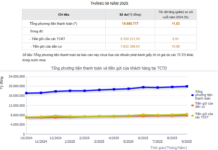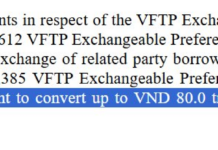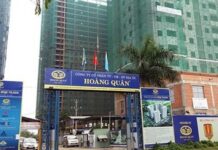
Over the past decade, Vietnam’s per capita GDP has surged from $1,960 (in 2013) to $4,280 (in 2023). With a population of 100 million, a rapidly increasing smartphone penetration rate, and a growing middle class, Vietnam is considered a promising market for retail banking.
Since 2015, when the banking sector emerged from a crisis and embarked on new business strategies, many banks have identified retail lending as a strategic direction.
Retail lending encompasses various types of loans to individual customers, such as consumer loans, business loans, home loans, and auto loans. Additionally, some banks include small business loans in their retail lending portfolio. In the consumer lending segment, both banks and financial companies have been actively providing cash loans and installment loans without collateral requirements, which have yielded significant profits.
The rationale behind this trend is that retail lending helps diversify risks and enhance profitability due to higher net interest margins (NIMs) compared to lending to large corporations. In fact, banks with the highest return on equity (ROE) are often those with a higher proportion of retail lending, with some even surpassing the 30% mark.
Despite its potential, the retail lending market in Vietnam is facing unprecedented challenges in recent times. According to VIS Ratings, in the first half of 2024, several banks reported a high proportion of newly formed non-performing loans, mainly attributed to the retail and SME lending segments. Moreover, the profits of some retail-focused banks have declined due to lackluster growth in home loans. In contrast, larger banks have witnessed improved profits thanks to credit growth in the corporate customer segment.

According to VIS Ratings
According to Lawyer Truong Thanh Duc, a banking and finance expert, the slowdown in retail credit growth is consistent with the overall low credit growth in the industry during the first months of this year. While the pace may be slower, the scale is not significantly lower compared to previous years. There is no major cause for concern regarding retail credit growth. However, the risks associated with retail lending are worrisome and will likely create difficulties for credit institutions.
In reality, non-performing loans in the banking sector are trending upward, reaching their highest level in many years. Data from the State Bank of Vietnam reveals that, as of the end of June 2024, the ratio of non-performing loans on the balance sheet stood at 4.56%, higher than the 4.55% recorded at the end of 2023 and 2.03% at the end of 2022. When taking into account potential non-performing loans, bad debts sold to VAMC, and other factors, the non-performing loan ratio climbs to approximately 6.44%.

“The risks in retail lending are as clear as day,” said Lawyer Truong Thanh Duc. Firstly, the most typical risk is the lending rate, especially for retail lending in Vietnam, which is consistently among the highest in the world. Secondly, banks and financial companies face challenges in debt collection due to inherent reasons and new factors.
“The new factor is the economy’s difficulties, which have affected the livelihoods, jobs, and incomes of many workers, impacting their debt repayment ability. The inherent reason is the low awareness of debt repayment and commitment compliance among borrowers in Vietnam,” the expert said.
Particularly, since the Resolution 42 expired, credit institutions have faced challenges. Specifically, after December 31, 2023, when Resolution 42 ceased to be effective, all provisions regarding the seizure of secured assets became invalid. The current regulations related to the handling of secured assets, such as the 2015 Civil Code and the Government’s Decree No. 21/2020/ND-CP dated February 17, 2020, do not include provisions on the seizure of secured assets.
This implies that credit institutions and organizations engaged in buying and handling bad debts can no longer apply the measure of seizing secured assets during the process of handling bad debts.
“When Resolution 42 was still in effect, there was some social pressure that helped improve borrowers’ awareness of debt repayment, and we also had support from the courts and authorities. As a result, the phenomenon of debt evasion was not as rampant as it is now. Nowadays, with the expiration of Resolution 42, debt evasion has increased significantly, and groups encouraging each other to evade debts have emerged rapidly,” he added.
Mr. Duc asserted that debt evasion is a blatant disregard for the law, commitments, and trust. Therefore, banks and financial companies will continue to face challenges in the coming time, especially in unsecured consumer lending.
Even in secured retail lending, such as real estate and automobile loans, dealing with bad debts remains extremely difficult. The current legal regulations are still fraught with overlaps and inconsistencies.

(According to Lawyer Truong Thanh Duc, the regulations are still overlapping. Banks are holding millions of old land-use right certificates, which means they may have to pursue lawsuits for 30-40 years)
“For instance, the recently issued land law has its shortcomings. Starting from January 1, 2025, households will no longer be allocated land, granted land use rights, leased land, or recognized as land users or allowed to transfer land use rights. However, this is a matter of the next five to ten years. For now, banks are still dealing with millions of old land-use right certificates, which means they may have to pursue lawsuits for an additional 30-40 years,” Lawyer Truong Thanh Duc illustrated.
Mr. Duc also added: “Resolution 42 has expired, but debt collection services are prohibited, which I think is unreasonable and needs to be reconsidered. Debt collection is a legitimate and necessary action. On the other hand, any acts that infringe on privacy, life, health, honor, or dignity should be strictly handled. There is no need to ban debt collection services.”

(Lawyer Truong Thanh Duc believes that debt collection services should not be prohibited)
The expert suggested that it is time to reconsider the prohibition of debt collection services, not only for loan debts but also for legitimate transactions such as payment collection and wage collection. “When permitted, this profession must be strictly managed to curb negative aspects. Instead of banning debt collection services altogether, we should regulate them effectively as they are an important mechanism to support creditors in debt recovery and encourage borrowers to be more conscious of honoring their commitments,” he added.
The Mastermind Behind the Chinese Loan Shark Ring Absconds; 135 Accomplices Face Justice.
The syndicate, led by Li Zhao Qiang (born 1988, Chinese), offered high-interest loans to 120,780 customers in Hanoi and across Vietnam. With a staggering loan amount of over VND 1,607 billion, the group illicitly profited over VND 732 billion. However, Li Zhao Qiang has since fled the country.
UOB Vietnam Bank Bags Two Awards from Asia’s Leading Financial Magazine
With an impressive track record in business strategy, UOB Vietnam has clinched two prestigious awards at the Asian Banking and Finance Awards 2024. The bank was recognized as the “International Retail Bank of the Year” and also lauded for its innovative services, winning the “Innovation in Banking Services” category.








































